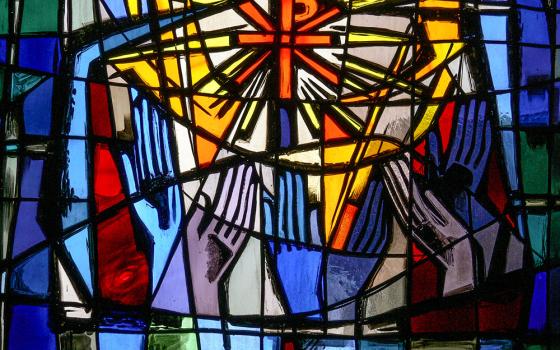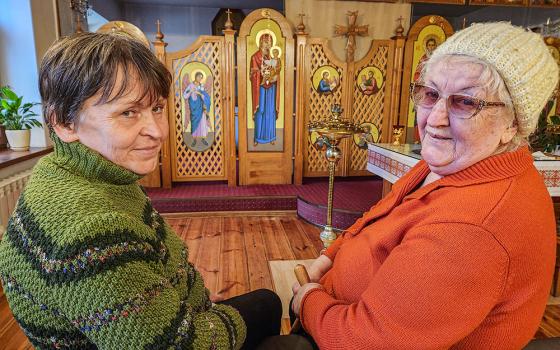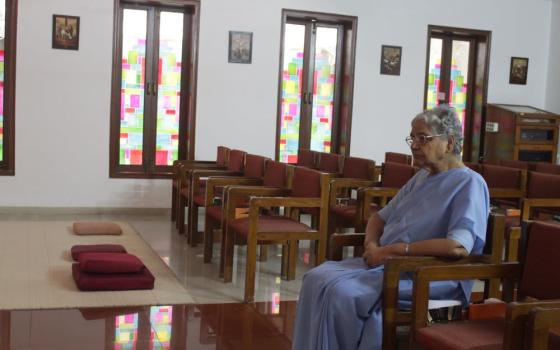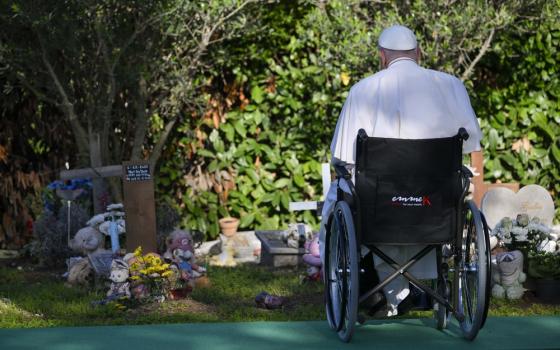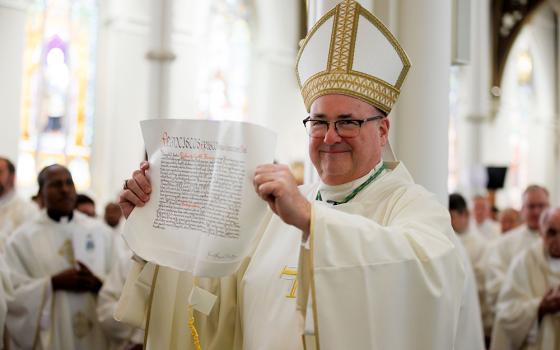
The three founding Sisters of the Little Way are, from left, Sr. Danielle Victoria Lussier, Sr. Theresa Aletheia Noble and Sr. Maria Kim-Ngân Bùi. They chose a gray tunic to represent ashes and renewal, a black scapular to represent obedience to God's beauty until death, and a teal veil to represent the Blessed Mother's intercession. (Courtesy of Sisters of the Little Way)
A new private association of the faithful, founded by three former Daughters of St. Paul sisters, has been recognized in the Archdiocese of Portland, Oregon. The charism of Sisters of the Little Way of Beauty, Truth, and Goodness is ministry and outreach to the wounded, the doubting and the marginalized, particularly those who have been harmed by the church.
The association currently includes three sisters: Srs. Theresa Aletheia Noble, Maria Kim-Ngân Bùi and Danielle Victoria Lussier. Their private vows were recognized by Portland, Oregon, Archbishop Alexander Sample on Sept. 22.
None of the sisters are new to religious life; they have each spent more than a decade as members of the Daughters of St. Paul, whose primary charism is outreach and evangelization. Noble received significant attention from the secular press in 2021 for her focus on "memento mori" (remembering death). That year she went to Italy to prepare to take her final vows, but instead was led to discern something new.
"We never intended to begin a religious community and none of us ever even entertained the idea prior to any of this," Noble said. "But over a year ago, the Lord began moving in our hearts and made clear to each of us that he was calling us to something new."
A private association of the faithful is the first institutional step to becoming recognized as a religious institute in the Catholic Church. The three sisters feel led by the Holy Spirit and say that this is what God wants them to be doing right now. It's unclear how long the process will take.
"We know God will inspire us because he loves the people who have been hurt by members of the church infinitely more than we can even imagine," Bùi said.
St. Thérèse of Lisieux is an inspiration for the group's name, the sisters said, adding that their name choice is rooted in the little way of the Gospel and in the humility of God.
The sisters chose to base their community in the Archdiocese of Portland because of Sample's response to the 2018 Pennsylvania grand jury report, and felt he would support their mission. The report detailed 70 years of clerical sexual abuse in Pennsylvania. At the time, Sample wrote, "Even though we may be outraged at what has happened, in our pursuit of justice we must not and cannot forget those who are victims. They need our prayers, compassion, assistance, and encouragement."
The sisters also note that Portland is one of the least religious cities in the United States: 42% of residents are religiously unaffiliated, according to the Public Religion Research Institute's 2014 American Values Atlas.
"These are our people, not just so we can 'evangelize' them in some kind of utilitarian, objectifying way, but we believe we have a lot to learn from them," said Noble, who was an atheist herself for 10 years. "The voices of those outside of the church need to be heard in the church."
Their ministry to address the harms and concerns of people on the outskirts and victims of abuse matches needs addressed in the synthesis document released at the end of the October synod on synodality. The sisters hope to be able to promote healing and inspire meaningful change.
They want to work with people that have already been responding to these issues and to listen deeply to those who have been harmed, such as Awake Milwaukee, a group of Catholic laity that formed in 2019 to support survivors of sexual abuse
"We've been deeply inspired by many courageous groups both inside and outside the church," Bùi said. "It's been so humbling to have conversations with some of these groups, like Awake Milwaukee, and to receive their experience and wisdom."
The sisters are aware of the damage clerical sexual abuse has done to the faith of American Catholics. Their website cites a 2021 Georgetown University study that found that 31% of American Catholics were embarrassed by their faith identity because of clerical sexual abuse. The site also quotes a Gallup poll that reported that 39% of Catholics in 2019 were re-examining their religion due to clerical sexual abuse, up from 22% in 2002.
The sisters said they hope to reach people along a wide spectrum of faith and belief: the regular Sunday Mass-goer who feels deep concern about the church's behavior, the Catholic who is lapsed because of abuse, and the person who does not know the faith and is disinterested because of what they've heard.
They also want to support people who have been victims of less frequently discussed forms of harm, particularly spiritual abuse.
Advertisement
With only three sisters at this time, their core ministry so far is listening and prayer. They pray the rosary in reparation for the sins of the church, uniting their prayer with Mary, Our Lady of Surrender and Protector of Anawim.
The sisters see beauty as a key part of their mission and of sharing the Gospel, but are also aware how beauty has been used to minimize abuse. The sisters say that beauty represents God and God's truth, but that it is easy to talk about and use beauty in a way that is unhelpful. The sisters say they are conscious that those within the church often do not realize how they come across to people outside the church.
"Unfortunately, when we try to harness the power of beauty in the church we often unintentionally render beauty self-referential because we have separated it from its origin for self gain or profit," Lussier said. "Bastardized beauty may sell but it does not heal."
Media is core to the sisters' mission, but Lussier thinks it's critical to be conscious of the ways that Catholics use media.
"While we will create media, we also will reflect deeply on the reality that while members of the church might have the best intentions to evangelize through media, the way we use media has the potential to empty the Gospel of its meaning and worse yet, wound the very people we seek to serve."
Editor's note: This story has been updated throughout to clarify some sentences.
